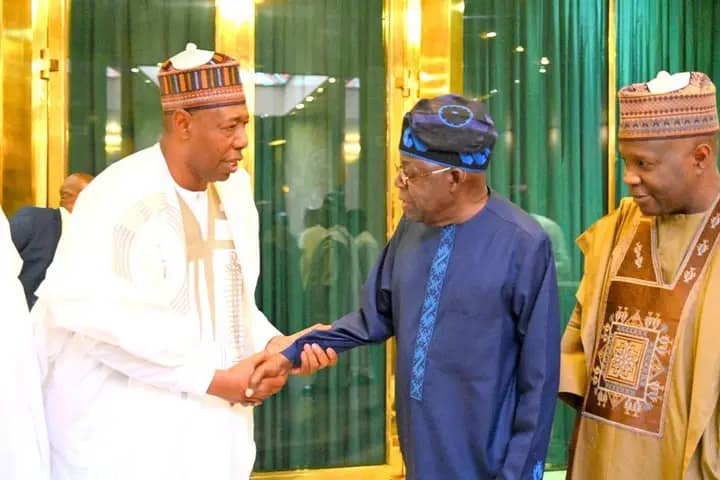
Iliyasu Abdullahi Bah
The governors of Nigeria’s troubled Northeast on Wednesday stormed the Presidential Villa in Abuja, confronting President Bola Ahmed Tinubu with a hard-hitting list of demands on stalled projects, abandoned oil exploration, and the worsening security crisis threatening their region.
Led by Borno State Governor and Chairman of the North East Governors Forum (NEGF), Babagana Umara Zulum, the delegation of governors from Adamawa, Bauchi, Gombe, Taraba, and Yobe did not mince words as they pressed Tinubu for urgent federal action. The meeting, described by insiders as “tense but strategic,” focused on the completion of critical infrastructure, the revival of oil exploration in Kolmani and Lake Chad, and the intensification of counter-insurgency operations.
The Northeast, long battered by Boko Haram insurgency, banditry, flooding, and environmental degradation, has become a symbol of Nigeria’s unfulfilled promises. Billions have been earmarked for projects, yet roads, railways, and oil blocks remain abandoned, leaving millions trapped in poverty and insecurity.
The governors presented Tinubu with a comprehensive agenda, demanding the completion of 17 strategic road and rail projects, including the Kano–Maiduguri Road, PortHarcourt–Jos–Bauchi–Maiduguri Railway, and Bama–Mubi–Yola Road. They argued that these projects are the lifelines of the Northeast, without which economic growth, mobility, and regional stability would remain impossible.
On oil exploration, the governors pushed hard for the immediate resumption of drilling in Kolmani (Bauchi/Gombe) and Lake Chad (Borno), warning that delaying the projects would mean lost opportunities for jobs, revenue, and development. They insisted that economic activity must complement military efforts in quelling insurgency, stressing that “development is the most potent weapon against terror.”
Security dominated the talks, with the governors urging intensified military strikes in flashpoints such as Lake Chad, Sambisa, Mandara Hills, and Dajin Madama, alongside greater funding for the Multinational Joint Task Force to cripple insurgents operating in the Tumbus of Lake Chad. They also demanded urgent reclamation of vast forests for agriculture, arguing that hunger and unemployment remain the breeding ground for extremism.
But the push for action was not without controversy. Supporters of Tinubu, including some Northern leaders, hailed his administration’s reforms and foreign policy drive, insisting that while painful, the President’s economic agenda is laying the groundwork for long-term growth. Presidency allies flooded X with messages touting Tinubu’s global engagements and reforms as proof of his commitment to equitable development.
Analysts, however, see the meeting as more than just policy talk. With the 2027 elections looming, Tinubu’s outreach to Northern governors is viewed as a calculated move to consolidate his political base and neutralize accusations of regional neglect.
Responding, President Tinubu assured the governors that his administration would not abandon the Northeast. He pledged to prioritize infrastructure, oil exploration, and security, insisting that his government operates on the principles of fairness, justice, and equity across all geopolitical zones. “No region will be left behind,” he said, rejecting claims of bias.
Yet for millions in the Northeast, words are no longer enough. Their hope now rests on whether Wednesday’s fiery meeting at Aso Rock will finally break the cycle of promises unfulfilled.

